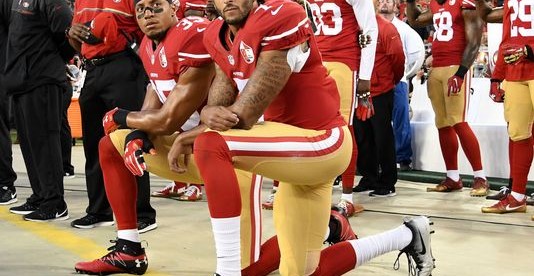How the Law Sees Kaepernick’s Protest

By Lee Henderson
Colin Kaepernick’s decision to take a knee during the playing of the Star-Spangled Banner has sparked much conversation about the customs and legal rules expected during the National Anthem. While some take offense to the issues the back-up quarterback is kneeling for, most critics are offended by what they perceive as a disregard for the military members who fought and died for the flag (despite Kaepernick’s denial.)
Since the Anthem’s first use in the early 1900’s, standing during it’s playing was a contentious issue. Following Hoover’s declaration that the Star-Spangled Banner be the country’s official national anthem in 1931, a poll revealed that public opinion was split as to proper behavior during the Anthem, half of respondents saying mandated standing was overly authoritarian.
Congress weighed in on the issue when it passed 36 U.S.C. § 301, also known as the National Anthem Statute, which said that people should “face the flag and stand at attention with their right hand over their heart.” Although this still stands as law, no criminal penalties were ever prescribed in case of violation of the provisions.
The Supreme Court also took its turn commenting on the status of these customs as they pertain to the Pledge of Allegiance. In West Virginia State Board of Education v. Barnette, the majority struck down a West Virginia state law that required the recitation of the Pledge at the beginning of every class by each student. “Those who begin coercive elimination of dissent soon find themselves exterminating dissenters. Compulsory unification of opinion achieves only the unanimity of the graveyard,” said Justice Jackson at the time. This landmark First Amendment case set the stage for the recognized tolerance of silent dissent from patriotic activities.
As these issues pertain to Kaepernick specifically, the NFL’s Personal Conduct Policy demands that its employees “avoid conduct detrimental to the integrity of and public confidence in the National Football League” but states no formal rule requiring players to stand during the playing of the National Anthem. Roger Goodell expressed his own personal distaste for Kaepernick’s actions, as well as the League’s, but also emphasized players’ right to use their platform for social change as long as it is done in a respectful manner. While this kind of tolerance leaves room for improvement, it is a far cry from the oppressive policies of the 1968 International Olympic Committee.
The bedrock of the First Amendment is built upon the notion that offensive behavior need not be unconstitutional (Kennedy, J., concurring); it is the Amendment’s success that opposition can be heard and not suppressed. If there is any offense to be taken from the Kaepernick controversy, it is that there are people living in America today who feel the need to take a stance on racial inequality. Tactics aside, Kaepernick’s knee spurred forward an important conversation about police brutality and racial bias that most can agree is worth having, no matter which side of the controversy you fall on. We can all thank the First Amendment for this conversation.
